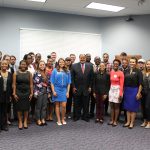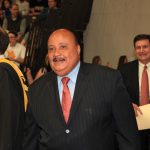By: Bethany Vonseggern and Julie Barber
Civil rights activist,. Global humanitarian. Political leader.
Martin Luther King III, the oldest son of the late Martin Luther King Jr. and Coretta Scott King, spoke at the 24th R. Dan Boulware Convocation about his path to carrying on his father’s legacy by embracing the ideals of freedom, justice and equality.
King boldly highlighted the current unrest of America as seen through police violence and hate crimes. He spoke about intolerance and social neglect, but also patriotism and hope.
“I believe that the overwhelming majority of Americans really do embrace the ideals of freedom, justice, and equality,” King said. “…the human spirit has a desire to make a difference and help, that’s how I know America really is great.”
Evan Hart, assistant professor of American history specializing in African American history and women in the civil rights movement, felt that King did a remarkable job relating his father’s message to the 21st Century.
“Talking about how there is a way to make a difference, even when it feels that the challenges are insurmountable,” Hart said. “That if you do think big picture; if you do think long-term and you do think about what you can do as an individual – those are things that can help inspire students who often feel that it’s nearly impossible for them to really make a difference in the world, when in fact, that is the only thing that does make a difference in the world, is individuals speaking up and speaking out.”
King also spoke about how nonviolence is not passiveness and pleaded with the crowd to resist violence because it’s the best way to end hate crimes and intolerance.
“Please don’t go there, especially if you want to be a credible adversary for freedom, justice and equality,” King said.
King mentioned how media coverage gives more credit to violence than it deserves which only amplifies the effect of the crime, such as violent acts of the white supremacy groups in Charlottesville. He is often asked what his father would have thought about today’s police violence against people of color, and “[doubts] that he would’ve been surprised that more than half a century later it’s still a major problem.”
King believes that improving police recruitment, law enforcement training, and introducing racial sensitivity training can help prevent police brutality. He also believes that more diversity within law enforcement could be a solution.
Co-chair for the convocation ceremony, Diane Holtz, had the distinct pleasure to spend time with King throughout his visit to Western. Holtz claimed that King was thoughtful with every answer and stayed on message, and he even took extra time to engage with students along the way.
“I think he was one of the best speakers we’ve ever had. He really hit on all cylinders. I think he was just absolutely what a speaker on a campus should be, what a convocation on critical issues should be,” Holtz said.
King’s speech was broadcasted live across campus to students and community members. Although his topics of discussion may have been raw and difficult for some to hear King addressed the audience with passion and grace. He closed his speech discussing the building blocks of a dream, how all must believe in the dream to help make it a reality and how everyone must dare to dream.
King’s overarching message left the audience with one impactful question that should be asked. How does this serve the cause of freedom injustice and equality?



